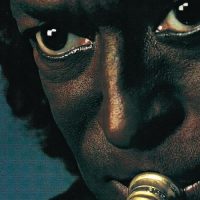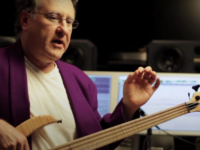by Pico
Ever since Miles Davis passed away in 1991, there’s been endless Miles tribute albums by artists influenced by him whether by listening to him or even by playing with him.
More recently, tribute albums have focused more on the enigmatic electric period and we even covered a few of them already, such as one by David Stryker.
Jazz saxophonist Dave Liebman had already put out a nice Davis tribute album back in ’94 called Miles Away. But thirteen years later, Liebman is back at it again but with a different twist: an album intended to recall not the “In A Silent Way/Bitches Brew/Jack Johnson” early electric period, but rather the more overlooked On The Corner/Get Up With It era. More precisely, the period of time Liebman himself was recording and touring in the Miles Davis band.
This was a good project to tackle, not just because the leader identifies so directly with the music that inspired this collection, but also because the period between 1970’s Live-Evil and the dual live epics of 1975 (Agartha and Pangaea) remains a largely underappreciated and misunderstood section of Davis’ vast work.
Dave Liebman grew up in the sixties playing tenor sax in a fifties rock ‘n’ roll setting until John Coltrane changed his outlook on music. Eventually, Liebman worked his way up the jazz scene, studying with Lennie Tristiano and Charles Lloyd and playing in Elvin Jones’ band before first recording with Miles during the 1972 On The Corner sessions. Liebman’s eighteen month stint in Miles’ band began the following Janaury. Afterwards, Liebman has performed and recorded both as a band member for several groups and as a solo artists, covering a multitude of settings and flavors of jazz along the way.
While Liebman is more than capable on a variety of wind instruments, like the tenor saxophone and flute, his primary weapon of choice is the soprano sax, sounding to my ears closest to Lee Konitz and Steve Lacy. And like Lacy, he’s shown a willingness to play outside but is equally comfortable in bop and naturally, fusion.
But back to Back On The Corner. For this project, Liebman wanted to capture the essence of Miles’ music during his time in the band, of which he states “the main premise was the rhythm and texture with the elements of harmony and melody taking a back seat.”
For this session, Liebman used his regular band of Tony Marino on bass, Vic Juris on guitar and Marko Marchinko on drums—and supplemented it with an extra bass (Anthony Jackson) and fellow Miles alumnus Mike Stern on second guitar. The additional bass and guitar was taking a page from the old boss’s playbook; Miles loved to double up on some instruments if it helped him to achieve a thicker, knotty sound. The extra coordination involved demands especially attentive musicians, which is why Liebman started with guys who were used to playing with him and supplemented them with guys who are used to playing with anybody.
The proceedings begin with a bassline that heralds the main melody of “5th Street,” a brooding but cool number that was no doubt intended evoke the character of the honoree. Liebman picks up the tenor for this one and is followed by one of Mike Stern’s signature soaring solos. In fact, Stern is heard prominently throughout, which is generally the only way Stern is heard. If you crave his guitar work like I do, consider this a treat.
Aside from the theme, “Ife” bares little resemblance to Miles’ version, but the slowed down beat anchored by Jackson’s ultra-low contrabass actually makes it sound more menacing than the original. Vic Juris takes his turn as the guitar lead, and does a nice job, evoking a little bit of Pete Cosey’s blues bent.
The only other Miles original here, “Black Satin”, immediately follows after a bass interlude. It’s much more recognizable than the impenetrable “Ife”, but lacks the chance-taking of the original; that wiggy drum/bass interplay and the inspired insertion of the Indian tablas on the 1972 version have no equal on the contemporary rendering, although Stern’s over-the-top wailing makes for a valiant effort.
“Bela” is a change-up tune, with a programmed synth providing an atmospheric background for a lyrical acoustic bass workout by Tony Marino before he gives way to some gentle phrasing by both guitarists.
After a ninety second drum interlude comes “New Mambo”. Here, Liebman switches back to a tenor for his solo instrument in a very Michael Brecker-sounding track, both in Liebman’s solo approach and in the melodic structure. Since Stern had worked extensively with Brecker as a sideman, his presence here gives this all the more appearance of being an unintended Brecker tribute (this record was recorded seven months prior to Brecker’s passing).
An acoustic guitar interludes segues into “Mesa D’Espana”, a softer, mildly Spanish flavored song where Liebman treats listeners with some wooden flute work before switching to soprano sax and trading some subdued but sublime licks with Stern.
Coming after an electric guitar interlude, “JB Meets Sly” may be the track that comes closest to a tune Miles would have likely played during Liebman’s tenure in his band. Mainly because it sports a heavily staccatoed rhythm, super-funky bass line and everyone else just soloing freely on top of it.
All told, this is a well played album with no real bad songs. But it’s missing that vibe. You know, that Miles vibe. Harmony and melody don’t really get dominated by rhythm and texture, which was the aforementioned stated main premise of this record.
So is this a recommended album? If you’re a Liebman fan, yes. Stern fans, too. Electric Miles fans might prefer, for example, Mark Isham’s Miles Remembered: The Silent Way Project because it just sounds more like a Miles Davis rock-jazz record. Back On The Corner sounds more like a Dave Liebman record. But if you were looking for a good, recent Liebman fusion effort, the more adventurous Flashpoint, which also includes Anthony Jackson, is a tad better choice overall.
Track Listing, with listening samples:
1. 5th Street
2. Ife
3. Bass Interlude
4. Black Satin
5. Bela
6. Drum Interlude
7. New Mambo
8. Acoustic Guitar Interlude
9. Mesa D’Espana
10. Electric Guitar Interlude
11. J.B. Meets Sly/5th Street Reprise
- Claudio Scolari Project – ‘Opera 8’ (2024) - April 25, 2024
- Nick Millevoi – ‘Moon Pulses’ (2024) - April 23, 2024
- Cannonball Adderley – ‘Poppin’ in Paris: Live at L’Olympia 1972′ (2024) - April 20, 2024




